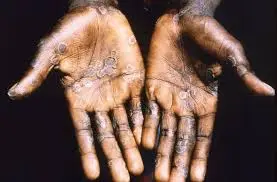jlk – The Africa Centers for Disease Control and Prevention (Africa CDC) has declared a public health emergency due to a significant surge in mpox cases across various African countries.
Since the beginning of 2024, 15 African countries have reported outbreaks, with the Democratic Republic of Congo (DRC) becoming the epicenter of the disease.
In the DRC, a new, more transmissible variant of the virus has sparked a significant increase in cases, and it has spread to neighboring countries such as Kenya, Rwanda, Uganda, and Burundi.
According to reports from Africa CDC, more than 2,000 cases and 13 deaths related to mpox have been reported across Africa in 2024, showing a sharp increase compared to 1,145 cases and seven deaths throughout 2023.
The World Health Organization (WHO) has responded to this situation by elevating their response to a global emergency, with the goal of mobilizing international resources to contain the virus’s spread.
Rapid Spread and Challenges Ahead
Mpox is primarily spread through close physical contact. While most cases are mild, the emergence of the more deadly Clade Ib variant has raised significant concerns, especially as it has had a more severe impact on children.
According to the WHO, this variant accounts for the majority of new cases recorded in the DRC and neighboring countries.
“We are facing major challenges in controlling this variant, especially in rural areas where access to healthcare services is extremely limited,” said a WHO official during a recent press conference.
On the other hand, some countries, such as Kenya and Uganda, have tightened their borders and ramped up public health measures to reduce the spread of the disease.
However, these efforts continue to face significant challenges, particularly with the lack of vaccine supply and medical resources on the ground.
Limited Vaccine Access and Its Impact
Vaccination is one of the key steps in handling this outbreak. Although there are three approved vaccines for mpox, access to vaccines remains severely limited in the hardest-hit countries, exacerbating the situation on the ground.
According to a WHO report, uneven vaccine distribution has been a major obstacle in efforts to contain the virus’s spread. “We need to ensure equitable vaccine distribution across affected regions to reduce the number of new cases and save lives,” said the Africa CDC Director.
In some areas, particularly in the DRC, mass vaccination campaigns remain difficult to implement due to poor infrastructure and ongoing armed conflicts. This adds to the challenges faced by health workers trying to control the outbreak.
WHO and other international organizations are currently working with local governments to address these obstacles and improve vaccine access.
Impact of the Outbreak on the Economy and Public Health
This surge in mpox cases has also had a significant impact on the economy and public health systems in Africa. Affected countries are facing immense pressure on their healthcare resources, with hospitals overwhelmed and a shortage of medical personnel.
Additionally, local economies, especially in rural areas, have been disrupted due to movement restrictions and fear of disease transmission.
“This situation is affecting all aspects of our lives, from access to healthcare to daily economic activities,” said a resident in a rural area of the DRC affected by the outbreak. “We hope for more support from the international community to help us cope with this crisis.”
Local governments have been attempting to mitigate this impact by providing emergency aid to affected communities, but the challenges are immense, especially with the virus’s rapid spread and limited available resources.
International Efforts and Future Outlook
In response to this situation, WHO and Africa CDC have been working with various international organizations to mobilize emergency assistance to the hardest-hit areas.
Their current focus is on increasing vaccine distribution, strengthening local health systems, and educating the public on how to prevent the disease’s spread.
Nevertheless, the path to controlling this outbreak is still long. Equitable vaccine access, increased medical capacity, and sustained international support are crucial to overcoming this crisis.
As WHO Director-General Dr. Tedros Adhanom Ghebreyesus stated in a statement: “We must work together globally to tackle this challenge. No country can handle this outbreak alone.”
The international community is expected to step up its support to address the spread of mpox in Africa and prevent further spread beyond the region.










